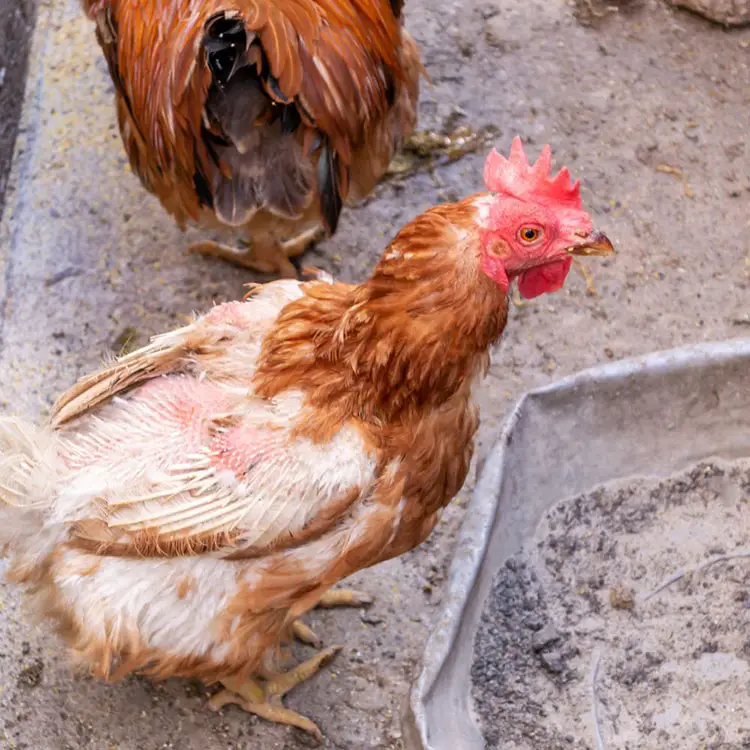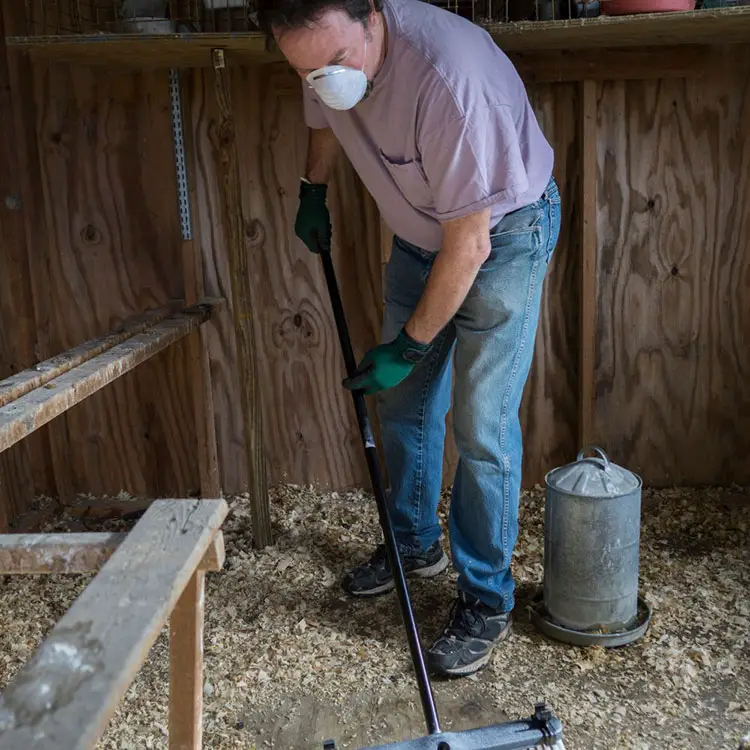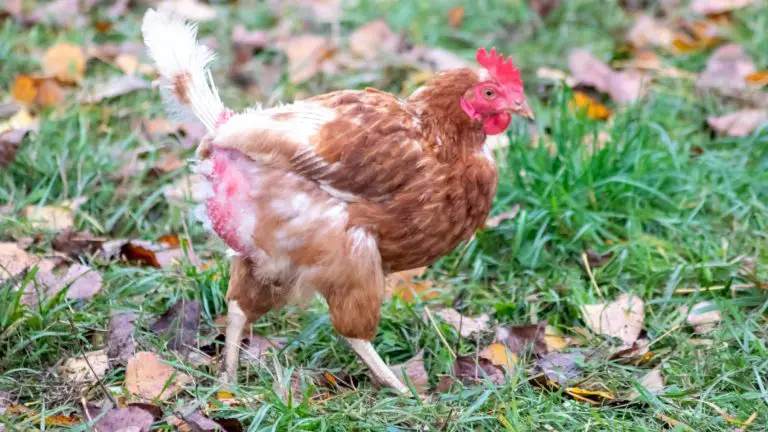You must be aware of the varying levels of care and attention that various breeds need if you are keeping hens. To raise a stable flock that won’t quarrel often or harass one another needs a lot of effort, patience, and devotion. However, there are some issues that even the most seasoned farmers deal with regarding the social life, general well-being, and general mood of their hens. While vaccinations and a balanced diet can prevent serious health issues for hens, some situations may result in feather loss, which while natural at times, may be bothersome and even dangerous.
In their lifetime on the farm, chickens will sometimes lose a few feathers. That is, however, cause for anxiety and fear that something more severe could be going on if it occurs regularly and begins to infect other hens in the flock.
There’s a clear way to distinguish between these feather-loss patterns, so you may be able to notice that in some cases, losing feathers is more serious than it seems. In certain situations, chickens may lose their feathers as a result of a seasonal change, stressful event, brooding, or even a fight with a rooster or other hens.
Because of this, it’s critical to monitor your flock to make sure they’re healthy, not under stress, and haven’t been ill from a virus, bacterium, or parasite infestation. You can determine if this alteration affects one or more of your hens or roosters by regularly checking on them.
Regardless matter the reason, we understand how unsettling and upsetting it may be to watch your hens suddenly lose their feathers. That’s why we focused on the reasons hens lose their feathers in this post, along with some solutions you may try to assist them with. To understand more and assist your hens in the process, keep reading.
Why Do Chicks Lose Their Feathers?
As previously stated, there are a variety of benign and minor reasons for feather loss in hens, ranging from moving to a new coop or growing up with new chicks to more significant issues like bullying and parasites (Red Mites).
We’ll go over every reason why hens lose their feathers below, ranging from minor ailments to major medical conditions. The most crucial thing is to identify the root of the issue, take the required action to fix it, and let the feathers grow back.
Ignoring the issue might possibly hurt your whole flock in addition to making your hens’ quality of life worse, particularly if the source of their feather loss is a disease or an unpleasant parasite.

Emphasize
Animals and birds, such as chickens, may begin to lose feathers when they are subjected to excessive mental and even physical stress, just as people do. Being accepted in the flock is very important to chickens since they are social animals that form their behavioral patterns as they mature.
They may experience stress for a variety of reasons, and these incidents might occur at various phases. A stressed-out chicken, especially a hen, will no longer produce eggs. According to a research, she could potentially begin to lose her feathers in addition to or instead of both.
A micro molt is what happens to a chicken when stress causes it to begin shedding feathers. Stress may arise in hens when they are not given nutritious food or clean water. Furthermore, some breeds might grow stressed out if they are surrounded by an excessive number of chickens or people.
They may grow anxious and lose feathers if your farms create a lot of noise, if they are exposed to excessive artificial light, or if they feel too hot or too cold. Stressful behavior might also arise from changes in a setting such as the coop.
How to correct it:
You must get rid of the stressor before you can make hens less stressed. To do so, you will need to keep a careful eye on your hens and notice if anything is upsetting them. In addition to offering a plenty of healthy snacks and fresh, clean water, you need also ensure sure the coop is kept at the right temperature. Ascertain that they follow a structured schedule and refrain from abruptly altering it for a time.
Every Year Molt
Stress causes a little molt to occur. On the other hand, an annual molt is a yearly event that is entirely normal. There’s nothing you can do to stop your hens from naturally plucking their feathers every autumn. Chickens lose hair in the same way as dogs and cats do.
Your chickens will start shedding in the autumn, depending on when they were born. At that point, they will be older than a year and maybe even 1.5 years.
Feathers lose their function over time, which is why this happens. They become too hefty and too hollow to permit the formation of air chambers for winter warmth. For this reason, molting enables hens to grow new feathers in place of their old ones.
The hens don’t lose their feathers in any particular sequence. Some may lose their feathers first on their heads and necks, while others will start losing them on their backs and tails. While it may take some time for them to sprout new feathers, they will undoubtedly become more attractive and useful as they do so.
How to correct it:
Although this is an inevitable natural process, there are techniques to speed up and lessen the agony for the hens involved. The pin feathers may hurt you or other birds if they mature and become fairly sharp.
The remaining blood quills contain a lot of protein, which the flock’s other hens will attempt to peck and consume. It’s crucial to take the hens out of the coop and place them in various areas where they can’t hurt one another if you see bullying among the hens, which may also result from this.
During this period, make sure the coop is warm and provide them access to additional feed that is high in protein. To promote the development of feathers, provide some vitamin-rich supplies and snacks that they may consume all day long.
Unhealthy Eating
Your hens may be undernourished for a number of causes, but it’s only a serious problem if your females stop producing eggs or begin to lose feathers. You will notice that your hens are shedding their feathers more quickly and that they are developing them more slowly if they are undernourished.
In light of this, you should pay attention to what your hens are feeding them. Your hens’ insufficient eating is probably due to their feed’s low grain and protein levels.
How to correct it:
To determine if your hens are getting enough nutrient-rich food, you may visit a veterinarian and adjust their diet appropriately. Offering them extra snacks over the winter might be beneficial in order to increase their intake of foods high in protein and fiber.
It’s possible that some chickens are defending the feed pots and keeping other hens from eating in bullying situations. Verify that this isn’t the case, and if it is, give your harassed females extra food in a more suitable spot or divide the flock.
They May Be Sick
Few infections will cause your vaccinated hens to lose their feathers. Nonetheless, gangrenous dermatitis, Marek’s illness, chicken pox, and several viruses may sometimes cause feather loss.
It’s important to note that many hatcheries and farms as a whole have successfully eliminated some of these illnesses via vaccination and other preventative measures. To make sure no other chicken becomes ill, the only thing you can do in the event of Marek’s illness or fowl pox is to provide them with appropriate therapy and treatment and keep them apart from the rest of the flock.
Hunters
It will cause stress for all the hens who watched a predator attacking them or taking many of them away. They often experience stress and fear, which causes them to lose some feathers.
It’s possible that the predator tried to take the chicken with them if you see that some of them have been lacking much more feathers than others, but the chicken managed to live and get away. Predators often cause chickens to lose their feathers, according to an Oxford investigation. Verify every chicken and make sure you take the necessary safety precautions to keep them safe. These include strengthening the security of the coop and run and even investing in a dog that excels at defending hens.
Insect parasites
One of the worst things that may cause hens’ feathers to fall off is parasites. The creepy crawlies on their bodies bother them, particularly the lice and mites that are the most frequent parasites. They adhere to the feathers and remain in the chicken’s body where it feels the wettest.
Your chicken will get agitated as a consequence, and it can start plucking feathers in an attempt to get rid of the parasites. Although mites do not feed on blood, lice do, and your daughters will find it very painful.
Some parasites are able to consume the follicles that produce feathers by tunneling deeply under your hen’s skin. These are the toughest to get rid of, so they could need some significant care.
How to correct it:
It’s critical to segregate the remaining hens you think are not impacted by the parasites and to alert veterinarians to this issue. In addition to treating your hens’ exterior parasites, cleaning your coop, nesting boxes, and brooders will help stop the parasites from spreading.
Getting ready
Chickens naturally maintain the proper position of their feathers during preening in order to shield them from external parasites. Occasionally, however, it will cause feather loss. Using their beaks, they apply the oil extracted from the preen gland to their feathers.
They will also remove any feathers that break or feel injured during that operation, which might give the impression that the bird is losing a feather. Fortunately, they won’t shed many feathers, and they will ultimately regrow, so there’s no need to be concerned.
Mistreatment
Among the hens, bullying is a typical occurrence, particularly for the bored ones. Because of this, some chickens have been known to pluck each other’s feathers, which may make your girls seem to be missing feathers. Particularly hostile and possessive roosters will scold one another, using much greater force in the process.
Unfortunately, the tension surrounding the bullying may sometimes become quite violent and bloody for the chickens. Having said that, you should pay close attention to your girlfriends and find out what triggers their aggression.
How to correct it:
This can be fixed in a few ways. One option is to keep the bully in the other coop or keep the other hens out of the confined space until you can determine what’s making them aggressive.
Overcrowding is one of the reasons of bullying, so if you see that your flock is becoming too large, you could try to divide it into two or three groups to keep things peaceful. Because they spend more time in the coop during the winter, hens may become bored, which is the second reason that is more prevalent.
gloominess
Because they experience so much anxiety and stress throughout the nesting process, broody chickens may sometimes tear off their feathers. They may pull the feathers from their breast during nesting if they get very broody.
That said, broodiness is probably the reason if you observe that your chicken is losing feathers, especially on the breast. In addition, the brooding hen will do this to provide a warm environment for the chicks when they hatch.
Rest assured—once the chicks hatch and become mature enough to care for themselves, the feathers will regrow.
Extra Hints and Techniques
Managing molting hens is a challenging task. This section is devoted to other tips that you might use to uplift the spirits of your hens and keep them from molting.
Ensure their amusement: Bringing the flock’s spirits up is one thing you can do, particularly in the winter. The hens will be less apprehensive and less likely to act aggressively against one another in this manner. Add perches, leaf heaps, and other fun items, and hang a cabbage for them to pick and play with.
Dust baths: To eliminate moisture from their bodies and ward against external parasites, your hens may immerse themselves in dust baths if they have parasites but their condition is not too severe.
Enhance your nutrition: It is well known that eating a diet high in protein can encourage the development of hair and feathers. When it comes to the hens, the molt often occurs in the autumn. At that point, you should add more vitamins and proteins to your diet. Add other delectables that are high in nutrition and taste.





![20 Nocturnal Birds [Images + IDs]](https://birdsology.com/wp-content/uploads/2024/02/nightjar-with-open-mouth-600x400.webp)
